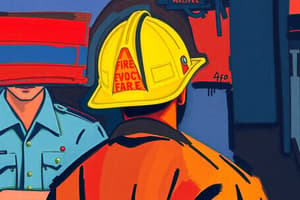Podcast
Questions and Answers
Effective supervision involves a collaborative relationship between the supervisor and ______ that aims to enhance the supervisee's skills, knowledge, and performance.
Effective supervision involves a collaborative relationship between the supervisor and ______ that aims to enhance the supervisee's skills, knowledge, and performance.
supervisee
Supervision models vary widely depending on the profession and ______ frameworks, but they all emphasize the importance of training, support, and guidance.
Supervision models vary widely depending on the profession and ______ frameworks, but they all emphasize the importance of training, support, and guidance.
theoretical
The primary functions of supervision include training, monitoring, evaluating, and providing feedback to the ______ to facilitate their professional growth and development.
The primary functions of supervision include training, monitoring, evaluating, and providing feedback to the ______ to facilitate their professional growth and development.
supervisee
Training often occurs through observation, demonstrations, coaching, and ______ instruction, allowing the supervisee to gain practical experience under the supervisor's guidance.
Training often occurs through observation, demonstrations, coaching, and ______ instruction, allowing the supervisee to gain practical experience under the supervisor's guidance.
Monitoring ensures that the supervisee's work aligns with established standards and ______, while evaluation helps the supervisor assess the supervisee's progress.
Monitoring ensures that the supervisee's work aligns with established standards and ______, while evaluation helps the supervisor assess the supervisee's progress.
Providing constructive feedback is essential for the supervisee's ongoing development and ______ enhancement.
Providing constructive feedback is essential for the supervisee's ongoing development and ______ enhancement.
Supervisors may also be responsible for adjusting supervision methods based on the supervisee's changing needs and ______.
Supervisors may also be responsible for adjusting supervision methods based on the supervisee's changing needs and ______.
Failure to follow personnel policies could result in ______ action, such as warnings, suspensions, or even termination.
Failure to follow personnel policies could result in ______ action, such as warnings, suspensions, or even termination.
Supervisors may assess the need for additional personnel or ______ and work closely with human resources to ensure that hiring processes are fair and effective.
Supervisors may assess the need for additional personnel or ______ and work closely with human resources to ensure that hiring processes are fair and effective.
Continuous ______ and professional development opportunities are essential for employees to maintain competence and adapt to changing circumstances in their roles.
Continuous ______ and professional development opportunities are essential for employees to maintain competence and adapt to changing circumstances in their roles.
Effective performance management helps ensure that employees are meeting expectations, while also identifying areas for improvement and supporting them in achieving their full ______.
Effective performance management helps ensure that employees are meeting expectations, while also identifying areas for improvement and supporting them in achieving their full ______.
As such, it is crucial for supervisors to be knowledgeable about various aspects of ______, from theoretical frameworks to practical skills, to effectively guide and develop their teams.
As such, it is crucial for supervisors to be knowledgeable about various aspects of ______, from theoretical frameworks to practical skills, to effectively guide and develop their teams.
Study Notes
Supervisor Roles
Introduction to Supervision
Supervision is a crucial aspect of professional development across various industries, including education, healthcare, mental health, law enforcement, and beyond. Effective supervision involves a collaborative relationship between the supervisor and supervisee that aims to enhance the supervisee's skills, knowledge, and performance while ensuring quality services or products for clients. Supervision models vary widely depending on the profession and theoretical frameworks, but they all emphasize the importance of training, support, and guidance in fostering competent professionals.
Functions of Supervision
The primary functions of supervision include training, monitoring, evaluating, and providing feedback to the supervisee to facilitate their professional growth and development. Training often occurs through observation, demonstrations, coaching, and didactic instruction, allowing the supervisee to gain practical experience under the supervisor's guidance. Monitoring ensures that the supervisee's work aligns with established standards and guidelines, while evaluation helps the supervisor assess the supervisee's progress and identify areas for improvement. Providing constructive feedback is essential for the supervisee's ongoing development and performance enhancement.
Tasks of Supervision
Some key tasks associated with supervision include developing learning plans, conducting regular meetings, setting performance goals, and documenting progress. Supervisors may also be responsible for adjusting supervision methods based on the supervisee's changing needs and circumstances, such as offering additional resources or referrals for specialized training. Moreover, the supervisor should promote open communication, encourage self-reflection, and foster mutual trust and respect within the supervisory relationship.
Personnel Policies and Procedures
A critical aspect of supervision is adherence to personnel policies and procedures, which set guidelines for employment practices and expectations. Supervisors should ensure that their employees are aware of these policies and are held accountable for complying with them. Failure to follow policies could result in disciplinary action, such as warnings, suspensions, or even termination.
Staffing
Recruiting, hiring, and promoting staff are integral parts of a supervisor's role, as they are responsible for ensuring that their team is well-equipped to perform the necessary tasks. Supervisors may assess the need for additional personnel or retraining and work closely with human resources to ensure that hiring processes are fair and effective.
Employee Training and Development
Continuous training and professional development opportunities are essential for employees to maintain competence and adapt to changing circumstances in their roles. Supervisors should identify relevant training programs and facilitate access to these resources. They may also provide coaching and mentoring to support individual growth and career advancement within the organization.
Employee Performance Management
Monitoring employee performance is another important task of supervision. This involves setting goals, tracking progress, providing feedback, and administering performance evaluations. Effective performance management helps ensure that employees are meeting expectations, while also identifying areas for improvement and supporting them in achieving their full potential.
In conclusion, supervisor roles encompass a wide range of responsibilities aimed at fostering professional growth, maintaining quality standards, and promoting organizational success. As such, it is crucial for supervisors to be knowledgeable about various aspects of supervision, from theoretical frameworks to practical skills, to effectively guide and develop their teams.
Studying That Suits You
Use AI to generate personalized quizzes and flashcards to suit your learning preferences.
Description
Test your knowledge on the roles and responsibilities of supervisors in professional settings. Learn about supervision functions, tasks, personnel policies, staffing, employee training, development, and performance management.




